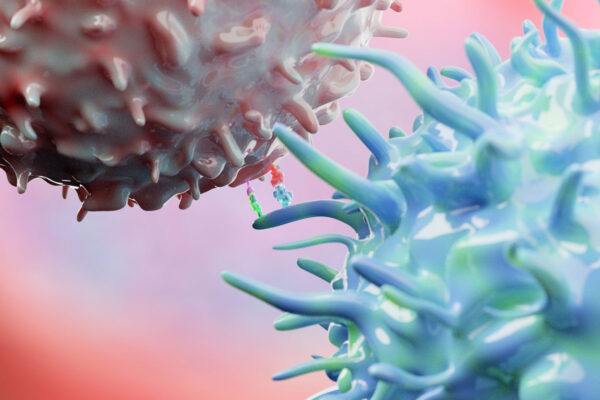
Solid tumors, with their intricate immune microenvironment, pose a formidable challenge to immunotherapy. Within this complex landscape, mast cells (MCs) and dendritic cells (DCs) emerge as important players influencing the resistance mechanisms that impede the immune system’s effectiveness against cancer1. Can their activities in this space be predicted reliably and turned against cancer cells?
Mast Cells. Traditionally associated with allergic reactions, mast cells (MCs) host a diverse array of receptors, including FcεRI (High-Affinity IgE Receptor) known for its role in allergies, Toll-Like Receptors (TLRs) that may recognize specific cancer-associated molecules, and cytokine receptors responding to interleukins and tumor necrosis factor (TNF). This diverse receptor repertoire enables MCs to exert influence over immune system activities, sometimes promoting a pro-tumorigenic environment and at other times displaying an anti-tumorigenic stance. Interactions with T cells, anti-viral mechanisms, and modulation of other immune cells within the tumor underscore the multifaceted role of MCs in the landscape of cancer.
This complexity makes the formulation of a one-size-fits-all strategy for addressing their role in cancer challenging. A therapeutic dilemma arises: should MCs be targeted for elimination because they are sometimes pro-tumorigenic, or should efforts focus on enhancing their anti-tumorigenic activities? MCs can adapt their activities based on the signals they receive. In the tumor microenvironment, characterized by factors like cytokines, growth factors, and other immune cells, the behavior phenotype of MCs is difficult to predict.
Dendritic Cells. DCs are indispensable in presenting antigens to T cells and initiating adaptive immune responses. Their diverse subtypes, including plasmacytoid DCs, classical DCs type 1 and 2, DC3, and monocyte-derived DCs, exhibit functional heterogeneity influenced by the molecular milieu of their surroundings. Despite decades of exploration in DC-based cancer vaccines, their efficacy faces limitations within the tumor immune microenvironment. Recent advancements targeting neoantigens2 and combining DC-based vaccines with other modalities3,4 may make progress toward overcoming these challenges.
Mast Cells and Dendritic Cells as Checkpoints. The dynamic interplay between MCs and DCs introduces another layer of complexity to the tumor microenvironment. Through secreted factors or direct interactions, both cell types impact each other, swaying DCs towards tolerogenic or immunostimulatory functions. In the realm of cancer immunotherapy, this interplay emerges as a cellular immune checkpoint—a critical regulator in solid tumor resistance.
Understanding the dynamics of MC-DC interplay not only sheds light on the complexity of solid tumors but has the potential to position these cellular interactions as crucial checkpoints in the immune response against cancer. Efforts to decipher the signaling pathways and molecular mechanisms involved in MC-DC crosstalk open avenues for innovative therapeutic approaches. The collaborative efforts of researchers and clinicians in unraveling the complexities of MC-DC interactions set the stage for tailored and patient-specific immunotherapies. The solid tumor conundrum may prove to be not just a challenge but an opportunity to harness the intrinsic capabilities of the immune system in the fight against cancer.
References
- Kalkusova, K., Smite, S., Darras, E., Taborska, P., Stakheev, D., Vannucci, L., Bartunkova, J., & Smrz, D. (2022). Mast Cells and Dendritic Cells as Cellular Immune Checkpoints in Immunotherapy of Solid Tumors. International journal of molecular sciences, 23(19), 11080. doi.org/10.3390/ijms231911080
- Garg A.D., Coulie P.G., Van den Eynde B.J., Agostinis P. Integrating Next-Generation Dendritic Cell Vaccines into the Current Cancer Immunotherapy Landscape. Trends Immunol. 2017;38:577–593. doi: 10.1016/j.it.2017.05.006
- Dammeijer F., Lievense L.A., Kaijen-Lambers M.E., van Nimwegen M., Bezemer K., Hegmans J.P., van Hall T., Hendriks R.W., Aerts J.G. Depletion of Tumor-Associated Macrophages with a CSF-1R Kinase Inhibitor Enhances Antitumor Immunity and Survival Induced by DC Immunotherapy. Cancer Immunol. Res. 2017;5:535–546. doi: 10.1158/2326-6066.CIR-16-0309
- Garg A.D., Coulie P.G., Van den Eynde B.J., Agostinis P. Integrating Next-Generation Dendritic Cell Vaccines into the Current Cancer Immunotherapy Landscape. Trends Immunol. 2017;38:577–593. doi: 10.1016/j.it.2017.05.006
